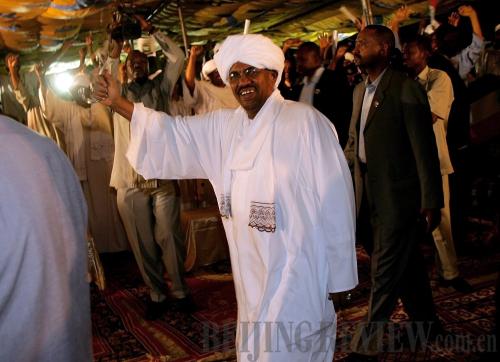|
 |
|
EMBRACING THE FUTURE: Sudanese President Omar al-Bashir attends a gathering celebrating his election victory in Khartoum on April 26 (XINHUA/AFP) |
From April 11-15, Sudan held its first multi-party general elections in 24 years—one that allowed incumbent President Omar al-Bashir a victory with 68 percent of the vote.
This vote was historic in terms of the Sahel nation's political development, according to Wang Jinglie, a research fellow at the Institute of West Asian and African Studies under the Chinese Academy of Social Sciences. In an article for Beijing Review, Wang, who served as a delegate member of the Chinese observation mission, wrote about Sudan's recent elections as he witnessed it, as well as the pressing challenges facing the nation. Edited excerpts follow:
Among the most complex elections anywhere, Sudan's recent voting process served not only to elect the president and state governors, but also members of parliament from a wide pool of candidates drawn from electoral districts, parties and women representatives.
In addition, the voting served to elect members of Sudan's state assemblies. Consequently, Sudanese voters cast eight ballots into three ballot boxes. Voters in Southern Sudan, meanwhile, cast four more ballots to elect the president of Southern Sudan (with one ballot) and members of the southern parliament (with three ballots).
On the spot
The Chinese observation mission monitored and inspected more than 30 polling stations throughout the capital Khartoum, as well as Juba, the regional capital of Southern Sudan. The Sudanese people were seen casting their ballots in high spirits—especially in the first two days—during a massive voter turnout.
The polling stations were quite crowded. In fact, we experienced difficulty even driving near many of the polling stations—and oftentimes we found ourselves stopping some distance away so as not to get stuck amid small oceans of people.
At the polling stations, we witnessed many local observers from different parties closely supervising the voting conditions. The working staff of the polling stations also performed their duties carefully, first confirming the identity of each voter, then issuing ballots and marking the fingers of the voters who had already received their ballots.
They kept ballot boxes empty before voting began, and locked and sealed them, and then recorded them after voting was finished.
Each ballot box was transparent with five different seals. Four were pasted between the lid and the main body of the box before their use, and one was added onto the cover of the slot after the box was filled with ballots.
All these details made it readily apparent that the management of the polling stations was conducted under strict and orderly terms.
The Sudanese voters we saw also exercised their rights in earnest. They waited in long queues and walked into each polling station individually. During the supervision process, we also saw elderly people in wheelchairs go to cast ballots with the assistance of their families.
After the ballots were closed on April 15, the National Election Commission convened a meeting to solicit opinions from international observers.
In all, the delegates agreed the vote was a successful one. A strong consensus emerged that there appeared no signs of fraud or corruption—much less any voter-related disturbances or violence.
Unavoidable challenges
Although Omar al-Bashir—who first came to power in a bloodless coup in 1989—won the elections with a comfortable majority, he will have to face a series of severe challenges during his term.
A separatist movement in Southern Sudan and the Darfur issue have both taken the lead. Under the Comprehensive Peace Agreement signed between the Sudanese Government and the Sudan People's Liberation Army in 2005, a referendum on southern independence is slated to be held in 2011.
Although the Sudanese Government has always voiced a commitment to a peace process between the north and the south, it remains unclear whether Khartoum could maintain a unified Sudan under such an accord.
The 10 states of Southern Sudan comprise one fourth of Sudan's total land mass and one fifth of its total population. Southern Sudan is also rich in oil, gold and water resources. Once any significant event takes place there, Sudan's political map will undergo big changes.
And while the current situation in Darfur is gradually calming, the roots of that conflict have yet to be eliminated. Once the situation changes, rather, the old, underlying factors will once again trigger new conflicts.
This would particularly be the case, for example, were Southern Sudan to declare full independence—something that, in turn, could aggravate the Darfur conflict, forming a severe potential danger for Sudanese hopes for unification and political development.
Another big challenge for Omar al-Bashir's administration is Sudan's national identity and social integration. Sudan is a multi-ethnic and multi-religious country. In all, there are 19 ethnic groups and nearly 600 tribes in Sudan. Across the vast country, blacks, Arabs and Bejas account for 52 percent, 39 percent and 6 percent of the population, respectively. Some 70 percent of the Sudanese are adherents of Islam, 25 percent are from indigenous tribal religions and 5 percent are Christians.
The long, grueling civil war and its political volatility have not only damaged Sudan's social and economic development, but also undermined its national identity and ability to function as a nation state.
Consequently, over more than half a century after independence, social integration in the former British colony of 42 million people has proven frustratingly elusive.
Thus Omar al-Bashir faces some fundamental challenges in a bid to enhance national cohesion: the establishment of a stronger national sovereignty and an effective political and legal order, the effective distribution of social resources and the protection of citizens' political, social and economic rights.
| 